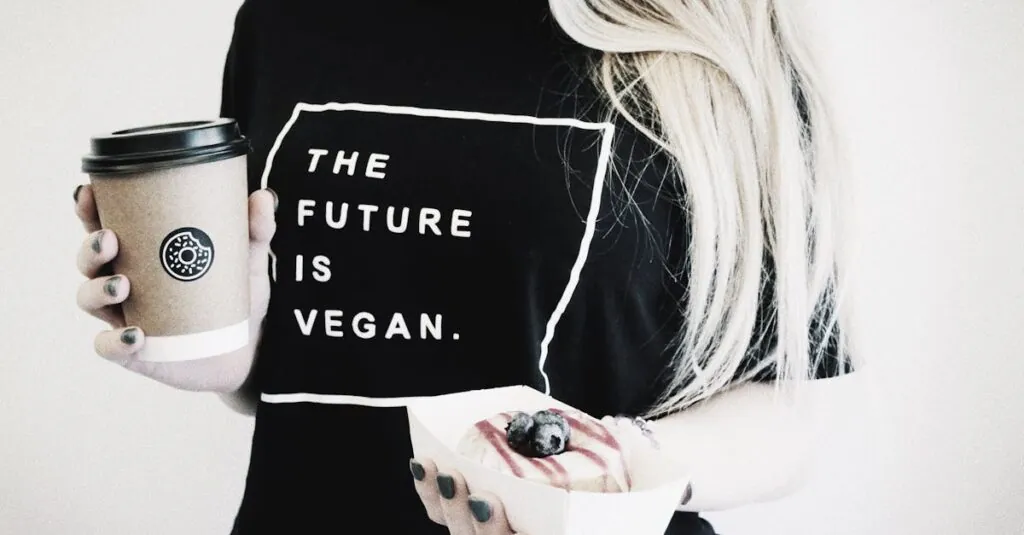In a world where fast fashion reigns supreme, the ethical fashion trend is like a breath of fresh air—or maybe a gentle breeze from a sustainable cotton field. As consumers become more conscious of their choices, they’re swapping out their closet’s guilty pleasures for stylish, eco-friendly alternatives. Who knew saving the planet could look this good?
Table of Contents
ToggleOverview of Ethical Fashion Trend
Ethical fashion represents a significant shift away from the fast fashion industry’s practices. Consumers increasingly support brands that prioritize sustainability and ethical production methods. Eco-friendly materials, such as organic cotton and recycled polyester, mark a growing preference for environmentally conscious choices.
Transparency plays a crucial role in ethical fashion. Brands that disclose their supply chains foster trust among consumers. Fair wages and safe working conditions for garment workers highlight a commitment to ethical labor practices.
Sustainable fashion also encompasses a focus on reducing waste. Many brands promote circular fashion, offering repair services and recycling programs. By encouraging consumers to reuse and recycle, the industry can combat the damaging effects of textile waste.
Inclusivity is another essential aspect of the ethical fashion trend. Many brands now offer diverse sizing options and designs that celebrate various body types. Representation and diversity in advertising campaigns add to the appeal of ethical brands.
Statistics reflect the growing impact of this movement. In 2023, over 60% of consumers reported making purchases from sustainable brands. This trend not only influences buying habits but also shapes the future of the fashion industry.
Innovations in technology further enhance ethical fashion. Companies utilize advancements like 3D printing to minimize waste during production. Additionally, digital platforms that facilitate buying and selling second-hand clothing contribute to sustainable practices.
Overall, the ethical fashion trend signifies a collective move towards responsible consumerism, emphasizing style without compromising values.
Key Principles of Ethical Fashion
Ethical fashion revolves around specific guiding principles that shape consumer choices and brand practices. This movement stresses the importance of sustainability and ethical standards in the fashion industry.
Sustainable Materials
Sustainable materials play a crucial role in this trend. Brands increasingly choose eco-friendly fabrics, such as organic cotton, recycled polyester, and Tencel. These materials reduce environmental harm and promote responsible sourcing practices. Innovations in textiles also ensure lower carbon footprints while maintaining quality and style. By prioritizing these substances, companies demonstrate their commitment to environmentally conscious production. In 2023, over 60% of consumers actively sought out brands utilizing sustainable materials, illustrating a shift in purchasing behavior.
Fair Labor Practices
Fair labor practices are essential for fostering ethical fashion. Companies that prioritize fair wages and safe working conditions demonstrate a commitment to their workers. These practices often include transparent supply chains that provide visibility into labor conditions, ensuring accountability. Additionally, brands that engage with their workers and offer training programs often see improved morale and productivity. Research indicates that ethical labor standards resonate with consumers, prompting them to support brands that value social responsibility. Implementing these practices creates a positive impact on both workers and the broader community.
Impact on the Environment
The ethical fashion trend significantly influences environmental sustainability by prioritizing resource conservation and reducing pollution.
Carbon Footprint Reduction
Brands committed to ethical fashion often source materials that lower their carbon footprint. Organic cotton and recycled polyester require less energy and water compared to conventional options. As a result, production processes generate fewer greenhouse gas emissions. Statistics show that over 60% of consumers made purchases from sustainable brands in 2023, reflecting a conscious shift towards eco-friendly choices. Additionally, investing in renewable energy sources aids in minimizing overall environmental impact. This collective effort by the fashion industry not only benefits the planet but also inspires consumers to make greener choices.
Waste Management
Waste management within ethical fashion emphasizes recycling and reusing textiles. Several brands implement take-back programs to facilitate garment recycling, reducing landfill contributions. Consumers increasingly seek options that align with these waste-reducing practices, motivated by sustainable values. Circular fashion models promote the design of durable products, ensuring they remain in use for extended periods. Innovations in upcycling also allow businesses to transform waste materials into new garments, further mitigating waste. This trend encourages responsible consumption while demonstrating that fashion and sustainability coexist harmoniously.
Benefits of Ethical Fashion
Consumers benefit from ethical fashion through enhanced awareness of their purchasing choices. Sustainable practices lead to healthier environments and improved working conditions.
Consumer Awareness
Informed consumers increasingly prioritize sustainability in their wardrobes. This heightened awareness drives demand for transparency in supply chains, encouraging brands to disclose their production practices. Ethical fashion promotes education on the environmental impacts of clothing, helping customers understand the benefits of eco-friendly materials. For instance, the switch from conventional cotton to organic cotton significantly reduces pesticide usage and conserves water. Ethical brands often share stories behind their products, fostering a deeper connection between consumers and their purchases. Overall, increased awareness empowers shoppers to make responsible choices that reflect their values, contributing to a more sustainable future.
Brand Loyalty
Loyalty to ethical brands grows as consumers align their values with their purchases. Brands emphasizing sustainable practices attract dedicated customers who advocate for their missions. Transparency helps build trust, and open communication ensures that consumers feel confident in their choices. Studies reveal that over 60% of shoppers intentionally seek out sustainable brands, influencing their buying decisions. When consumers recognize companies that invest in fair labor practices and environmental responsibility, they become brand ambassadors, promoting them within their communities. Consequently, ethical fashion fosters lasting relationships between brands and their customers, solidifying loyalty and commitment to shared values.
The ethical fashion trend represents a significant shift in consumer behavior and industry practices. As awareness grows about the impact of fashion on the environment and society, more individuals are making informed choices that align with their values. This movement not only champions sustainability but also fosters a sense of community among brands and consumers committed to ethical standards.
By prioritizing eco-friendly materials and fair labor practices, the fashion industry is evolving into a space where style and responsibility coexist. The future looks promising as innovations continue to emerge, paving the way for a more sustainable and inclusive fashion landscape. Embracing ethical fashion is not just a trend; it’s a lifestyle choice that contributes to a healthier planet and a fairer world for all.









